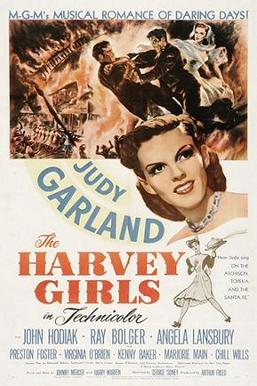
The Harvey Girls
The Harvey Girls is a 1946 Technicolor American musical film produced by Arthur Freed for Metro-Goldwyn-Mayer. It is based on the 1942 novel of the same name by Samuel Hopkins Adams, about Fred Harvey's Harvey House waitresses.[2] Directed by George Sidney, the film stars Judy Garland and features John Hodiak, Ray Bolger, and Angela Lansbury, as well as Preston Foster, Virginia O'Brien, Kenny Baker, Marjorie Main and Chill Wills. Future star Cyd Charisse appears in her first speaking role on film.
For the novel, see The Harvey Girls (novel).The Harvey Girls
George Sidney
Robert Alton (musical number)
Kay Van Riper (additional dialogue)
Edmund Beloin
Nathaniel Curtis
Harry Crane
James O'Hanlon
Samson Raphaelson
Eleanore Griffin
William Rankin
The Harvey Girls
1942 novel
by Samuel Hopkins Adams
Harry Warren (music)
Johnny Mercer (lyrics)
Lennie Hayton (score)
- January 18, 1946
102 minutes
United States
English
$2,931,000[1]
$5,175,000[1]
The Harvey Girls won an Academy Award for Best Original Song for "On the Atchison, Topeka and the Santa Fe", written by Harry Warren and Johnny Mercer.
Plot[edit]
In the 1890s, a group of "Harvey Girls" – new waitresses for Fred Harvey's pioneering chain of Harvey House restaurants – travels on the Atchison, Topeka & Santa Fe Railway to the American Southwest town of Sandrock. On the trip they meet Susan Bradley, who is travelling to the same town to marry the man whose beautiful letters she received when she answered a "lonely-hearts" ad.
Unfortunately, when she arrives, her husband-to-be turns out to be an "old coot" who does not at all meet her expectations, and vice versa. They start to argue and list their own personal faults, which they claim not to have mentioned in their letters. With their mutual disinclination to continue with the marital union clear, they jointly decide to call off the wedding.
With the marriage safely cancelled, he reveals to Susan that his letters were actually ghost-written as a joke by Ned Trent, the local saloon owner. Susan, rightly furious, confronts Ned to tell him off, in the process endearing herself to him.
Susan joins the Harvey Girls and she soon becomes their leader in fighting against the attempts by Trent's business associate, Judge Sam Purvis, to scare them away to maintain his own thriving business running the large saloon in town. The Harvey Girls also face the animosity of the so-called "dance-hall girls," led by Em, who is in love with Trent and sees Susan as a rival.
Trent visits the Harvey House, sees its value along with the other trappings of civilization, and then tells Purvis to leave them alone. Purvis continues with his campaign of intimidation, finally burning down the restaurant. Trent offers his saloon as a replacement and Em and the dance-hall girls leave town. Susan, thinking that Trent too is leaving, gets on the train, but Em, seeing that Susan loves Trent so much that she is willing to give up everything for him, stops the train and points out Trent, riding toward them on his horse. Ultimately, they wed in the desert, surrounded by the Harvey Girls.
Cast notes:
Critical response[edit]
Howard Barnes wrote in the New York Herald Tribune that the film was "A great big animated picture postcard. Judy Garland is the film's bright ... star. Miss Garland is effectively glamorized in get-ups of the (18)90's and sings her songs pleasantly. The Harvey Girls is a perfect demonstration of what Hollywood can do with its vast resources when it wants to be really showy ... pretty girls – period sets and costumes – lilting tunes – super-speedy dance shuffles."
The New York Daily News said it was "A nostalgic whiff of the old west. Judy sings several sentimental ballads, as well as On the Atchison, Topeka, and the Santa Fe number. Her chief support in the way of real entertainment comes from Ray Bolger." Time wrote "A technicolored musical celebrating the coming of chastity, clean silverware, and crumbless tablecloths to the pioneer Southwest. The bearers of this culture, according to evidence presented here, were waitresses. The Harvey Girls is good fun in spots. Miss Garland doesn't seem as recklessly happy as she was in St. Louis but she still appears to be having a pretty fine time."[13]
"On the Atchison, Topeka, and the Santa Fe" won an Academy Award for Best Original Song for Harry Warren and Johnny Mercer. In addition, Lennie Hayton's score was nominated for Best Music, Scoring of a Musical Picture, but did not win; the Oscar went to Morris Stoloff for The Jolson Story.
The film is recognized by American Film Institute in these lists: